- Home
- Sharon Cullen
An Unwilling Earl
An Unwilling Earl Read online
Table of Contents
Dedication
Chapter One
Chapter Two
Chapter Three
Chapter Four
Chapter Five
Chapter Six
Chapter Seven
Chapter Eight
Chapter Nine
Chapter Ten
Chapter Eleven
Chapter Twelve
Chapter Thirteen
Chapter Fourteen
Chapter Fifteen
Chapter Sixteen
Chapter Seventeen
Chapter Eighteen
Chapter Nineteen
Chapter Twenty
Chapter Twenty-One
Chapter Twenty-Two
Chapter Twenty-Three
Chapter Twenty-Four
Chapter Twenty-Five
Chapter Twenty-Six
Chapter Twenty-Seven
Chapter Twenty-Eight
Chapter Twenty-Nine
Chapter Thirty
Chapter Thirty-One
Epilogue
Prologue
Preview of Deceiving an Earl
Acknowledgments
About the Author
This book is a work of fiction. Names, characters, places, and incidents are the product of the author’s imagination or are used fictitiously. Any resemblance to actual events, locales, or persons, living or dead, is coincidental.
Copyright © 2019 by Sharon Cullen. All rights reserved, including the right to reproduce, distribute, or transmit in any form or by any means. For information regarding subsidiary rights, please contact the Publisher.
Preview of Deceiving an Earl © 2019 by Sharon Cullen
Entangled Publishing, LLC
2614 South Timberline Road
Suite 105, PMB 159
Fort Collins, CO 80525
[email protected]
Amara is an imprint of Entangled Publishing, LLC.
Edited by Erin Molta
Cover design by Yellow Prelude Design, LLC
Cover photography by Period Images and Deposit Images
ISBN 978-1-64063-780-1
Manufactured in the United States of America
First Edition March 2019
Dear Reader,
Thank you for supporting a small publisher! Entangled prides itself on bringing you the highest quality romance you’ve come to expect, and we couldn’t do it without your continued support. We love romance, and we hope this book leaves you with a smile on your face and joy in your heart.
xoxo
Liz Pelletier, Publisher
For John. For buying me books on weird crimes throughout the centuries that fire my imagination and lead to story ideas. You’re the best.
Chapter One
London 1850
The day was gloomy, wet, and tired looking, as if London were simply weary of being a city.
Jacob Baker dodged a muddy puddle and stepped over a steaming pile of horse dung. With a quick sidestep he barely missed running down a finely dressed matron.
She sniffed and harrumphed and lifted her chin to stomp past him.
Jacob was late for a meeting with the estimable Oliver McCaron, the Earl of Armbruster. It was their weekly Mayhem Meeting, as they liked to call it, where they perused the newspapers looking for the most sensational crimes and tried to solve them while drinking copious amounts of port. They had been doing this for years. Jacob wasn’t quite sure how this amateur sleuthing actually started, but he seemed to remember it was after some drunken revelry.
A sudden shout from the street and the terrified cry of a horse made him turn to find the frightened animal, pulling a loaded cart of barrels, rearing onto its hind legs. Below him, cowering on the cobblestones, was a young man, arm extended to shield his face, head turned away from the deadly hooves.
Jacob jumped over a puddle to grab the young man’s arm and drag him away before the horse could trample him. The man was more of a boy, and he appeared to be quite wanting in the food department, for he was very insubstantial. So insubstantial that Jacob yanked much harder than needed and ended up on his rear on the wet cobblestones, the boy sprawled on top of him.
Quickly the boy pushed himself up, springing to his feet in a remarkably graceful way.
Jacob stood a little more slowly, brushing the mud and gunk off his trousers. The driver yelled a few obscenities followed by a rude hand gesture and urged the nervous horse on.
“Are you hurt?” Jacob asked.
The lad shook his head. His face was grubby. Only God knew how long it had been since it had been washed.
He was wearing a red velvet waistcoat with odd patches worn off in places. His jacket, so old and dirty that the creases were shiny with grime, was blue and sported wooden buttons. Even his shoes did not match, one black button-up, the other brown laced. His shirt was brown now but had probably been white at the beginning of its life.
The boy’s face was smooth, with not a bit of facial hair, and he had wide blue eyes. The eyes appeared larger, the cheeks sunken. Dirty blond hair stuck out from beneath an old top hat that he had shoved onto his head after Jacob unceremoniously yanked him out from the horse’s hooves.
“At least tell me that you are unhurt,” Jacob said.
“I’m fine.” This came out as a throaty whisper that Jacob strained to hear.
Jacob reached into his pocket and pulled out a coin. “Take this. Get a hot meal to calm your nerves.”
The boy looked at the offer warily, but his eyes told the real truth—that a hot meal was much needed.
Jacob waved the coin in the air. “Go ahead. Take it.”
The boy snatched the coin quickly and pocketed it even faster. “Thank you,” he murmured.
“You’re sure you’re unhurt?”
He nodded and then ran away. For a moment, Jacob stood in the middle of the street, splashed by the passing carriages and carts, and watched the boy weave in and out of the crowd until he disappeared down a side alley.
The doorman at Brooks gave Jacob’s muddied appearance an odd look but let him in anyway.
He found his friend, Armbruster, sitting in his usual nook, reading The Times. Other London newssheets were stacked neatly beside him.
Armbruster lowered the paper enough to eye Jacob’s wet and muddy trousers. “What happened to you?”
“Just another day saving lost boys from death by horse’s hooves.”
His friend grunted and folded the paper to place it on the table between them. Jacob read the headline and shook his head at the words meant to incite fear. “How many bodies has this been?”
“Four. Another woman. The police are speculating she was a servant, but it’s hard to tell since she was found with no head nor hands.”
“Horrifyingly bizarre.”
The city was nearly in hysterics, although Jacob was hard-pressed to determine exactly which kind of hysterics. People were alternately horrorstruck and enthralled—locking their servants inside while devouring the newspapers for more sensationalized details. Preachers were screaming from the pulpits that the devil was at work, and women—especially women of the serving class—were afraid to go outside for fear of being the next victim.
A bottle of their favorite port appeared, and the servant poured two healthy glasses before moving on.
Armbruster took a swallow of his. Jacob was not in the mood for port. Strangely, the encounter with the boy had shaken him. It wasn’t often that one saved a life. It was a peculiar feeling, and he wondered where the boy lived and what circumstances had brought him so low.
“Have you looked through the rest of the papers?” Jacob asked.
“Some. A woman’s husband was poisoned. That one is simple. She surely has a lover
and wanted the husband out of the picture.”
Love and jealousy. It was a common theme. He’d learned that most crimes were solved by looking to the ones closest to the victim.
“What else?” he asked.
Armbruster leaned back and eyed Jacob speculatively. “Word has it you’ve been elevated in Society.” This was said in the bored way that he affected when in fact he was anything but bored.
“You can’t believe everything you hear,” Jacob said, but he couldn’t match the blandness of Armbruster’s tone. His heart had suddenly dropped to his stomach. He was surprised Armbruster had said something and then surprised he’d been surprised. Of course he would say something.
“Oh, I have this from the most trusted source.” He paused. “My mother.”
Jacob winced. If the Dowager Countess knew of the inheritance, soon all of London would know.
“You are an earl. An earl, Ashland. With all of the benefits it entails.”
Jacob tapped the arm of his chair in irritation upon hearing his title come from his friend’s mouth. “I’m a solicitor, Armbruster. It’s what I’m trained for, and it’s what I want to be.”
“An earl is much better than a solicitor.”
Armbruster would say that. From the moment the man had drawn breath he’d been trained to be an earl. He’d been groomed for it before he could eat solid food. It was in his blood, and he fit the role well. He liked being an earl.
Jacob knew nothing about any of that and wasn’t sure he was even interested.
“I guess I should give my condolences on the death of your cousin.”
“Thank you, but I never met the man.” And now he’d inherited the title. “I don’t know the first thing about being an earl.”
“Never fear, friend. That’s where I come in. I’ll teach you all you need to know.”
Jacob snorted. “Spending your days at Brooks and your nights in houses of ill repute?”
“I don’t do that every night.” Armbruster appeared to be offended, but Jacob knew the opposite was true.
The man had a certain reputation that kept the matchmaking mamas away, for fear their lily-white daughters would be infected with whatever it was that he exuded.
He’d perfected the image of a classic rogue. A wretch who drank too much, slept too late, and was a general ne’er-do-well. But Jacob knew he was so much more. He was a shrewd businessman, skilled at making money. He’d catapulted the Armbruster earldom into one of the most successful and richest of the realm.
“Wasn’t your cousin married?” Armbruster asked.
“He left a wife and young daughter behind. Unfortunately, the wife has proven that she is not in delicate condition with an expected heir.”
Armbruster grunted. “And what will you do with the widow and her daughter?”
“I have no idea what I’m going to do with myself most days. How the hell am I supposed to decide what to do with them?”
“Well, let’s not think about that now.” Armbruster reached for the stack of newssheets. “Let’s find out what London’s underbelly has to offer us.”
Chapter Two
Four days later, the former Earl of Ashland’s solicitor called, wanting to discuss the changeover.
Time was running out, and it wasn’t because the late earl’s wife and daughter were waiting for him to make decisions or because his tenants on his newly acquired land were in a sort of limbo. It was because Armbruster’s mother knew and she wasn’t going to keep quiet for long. So he met with the man and discussed the estate, most of which was far beyond his knowledge. Jacob knew the law like the back of his hand but crops and rents? That was beyond him. He needed to learn much if he wanted to be successful, and there was no question he wanted to be successful.
He might not desire the albatross of a title, but he would do right by it. People depended on him, after all.
After the solicitor left, Jacob sat in his office, contemplating the change that his very comfortable life was about to undergo. The idea of the challenge excited him, but the thought of giving up his career saddened him. He knew enough to know that an earl could not also engage in work.
His housekeeper, assistant, and general person-who-took-care-of-him-and-his-house entered the front parlor that he had converted into his office.
She wrung the dust cloth in her hands, her white cap askew, wisps of wiry red hair poking out of the sides. Her cheeks were plump and continuously rosy, her nose pert, her eyes small, but always twinkling. She was the bane of his existence and the only person who held his life together.
For some reason, Agatha Smith loved Jacob like a mother loved a son. He’d never understood why, but he relished her affection.
“There’s a lady here to see you,” she said. “I tried to push her off, but she was having none of it. Said she would wait until you were available.”
Jacob closed his eyes and rubbed them with the pads of his thumbs. “I don’t recall having an appointment with a lady.” He really needed a secretary, a man of business, or someone who would organize his life a little better than he did.
Then he remembered that he wouldn’t be a solicitor for much longer and a secretary was not needed. Or rather a secretary like that. Damn, but he would need someone to run his life now that he was an earl. Isn’t that how it was done?
“I tried to tell her she needed to make an appointment, but she said this was an emergency.”
Jacob dropped his hands and looked up at Mrs. Smith, who was still wringing the cloth and looking anxious.
“I don’t do emergencies.”
Jacob Baker was a solicitor, but not the kind who wrote up wills and handled estates. He worked for the barristers, researching cases, interviewing witnesses, tracking people down when needed. He was a quiet man, who lived on a quiet street, in a quiet part of London, who received great satisfaction in working behind the scenes of the city’s courtrooms.
“Send her in, but don’t bring tea. I don’t want her staying too long. I’ll hear her story, send her on her way, and be done with it.”
“Yes, m’lord.”
The first time she’d called him “my lord” he had snapped at her and she had cried, and he’d felt like a heel. He could tell she was proud to be working for an earl now. It was so strange that “sir” had suited him just fine four days ago.
Jacob stood to button his coat, attempting to appear presentable. He normally did not have people come to him. He was the one who tracked people down. So he was interested to see what this woman wanted.
She entered, tall and gaunt, her stiff black skirts creating a rustling sound that reminded him of autumn’s dead leaves. Her face was long and thin, her chin pointed, her eyes cold, dark, and assessing. There was no warmth to her gaze, no smile on her lips.
“Mr. Baker, thank you for taking the time to see me on such short notice.”
Jacob indicated the chair in front of his desk, and the woman rearranged her skirts to sit. As he sat, she took a swift glance around his office, quickly weighing and judging her surroundings, her lips turned down in what Jacob thought was probably perpetual disapproval.
His home, like his life, was simple. The office walls were lined with law books. A fire burned in the grate, chasing away the chill of the rainy day. The only furniture was his desk, the two chairs in front of his desk, and little else.
A few gas lamps lit the corners, spreading a warm glow into the room.
“Mrs. Smith said that your business was of an urgent nature?”
She pulled out a piece of thick paper from her reticule. “I am Dowager Lady Morris.” She paused and watched for his reaction, but Jacob came up blank. He’d never heard of a Lady Morris before. The woman, however, seemed to think that he should have.
“I am the guardian of Charlotte Morris, the late Lord Morris’s niece. His deceased brother’s daughter.”
Jacob folded his hands on the top of his desk and tried to appear as if he were interested in the convoluted family tree of the Morris
es. The woman’s attitude and overall nature irked him. She clearly thought he should be impressed by her title, but titles had never impressed Jacob. A person’s nature was far more important than a hand-me-down title.
“Miss Morris has disappeared, and I need you to find her.”
Jacob raised his brows in surprise.
Lady Morris placed the paper on his desk and slid it toward him.
Jacob looked at the paper and was surprised to see a graphite drawing of a very beautiful woman. She was looking over a shoulder, hair tumbling down a back that wasn’t drawn in but rather assumed to be there. Loose, windblown curls were pulled away from her face and pinned in the back. Large eyes, full of laughter, looked at him. It was a rather good drawing with bold lines, swiftly sketched, giving just enough detail but not the full picture. Enough to let the viewer fill in the rest with his imagination.
“This is Miss Charlotte Morris?” he asked as he picked up the sketch. The eyes. Those eyes seemed so familiar.
“It is.” There was a pinched look around Lady Morris’s mouth. Jacob sensed disapproval. Of him or of Miss Morris?
He put the sketch down and folded his hands again. “I’m sorry, Lady Morris, but I’m not in the business of finding people. Perhaps a person employed in private investigatory work would better suit your needs.”
“I want you, Mr. Baker.”
Jacob’s irritation flared, but he tamped it down. “I’m a solicitor, my lady, not a private investigator.”
“I will pay you well.”
Jacob took a deep breath for patience. “It’s not about the money. It’s about my time, and it’s about my current obligations.”
Obligations that had now taken a severe right turn.
Lady Morris flicked the edge of the drawing with a long, yellowed fingernail. “My niece is missing. I need to find her. Surely you can understand my concern.”
Not really. Probably because he did not see concern coming from her. He thought that maybe she negotiated with the fishmonger with more passion than she was conducting this interview.
“Has she been kidnapped? Taken against her will?”
“I don’t believe so. No.”
“Run off with a lover?”

 Bound to a Spy
Bound to a Spy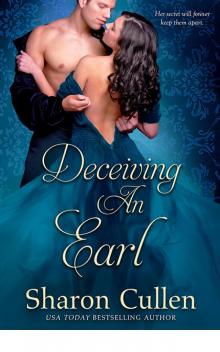 Deceiving an Earl
Deceiving an Earl The Notorious Lady Anne: A Loveswept Historical Romance
The Notorious Lady Anne: A Loveswept Historical Romance Wherever You Are
Wherever You Are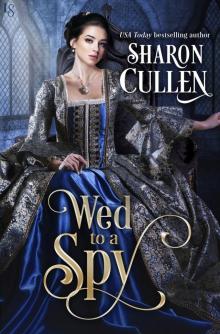 Wed to a Spy
Wed to a Spy Night Song
Night Song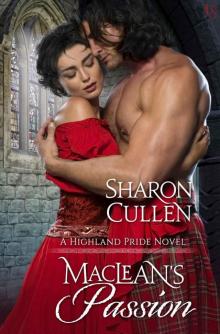 MacLean's Passion: A Highland Pride Novel
MacLean's Passion: A Highland Pride Novel Obsession: A Love on the Edge romance
Obsession: A Love on the Edge romance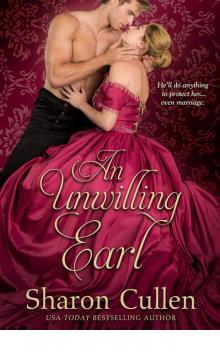 An Unwilling Earl
An Unwilling Earl His Saving Grace
His Saving Grace Sebastian's Lady Spy
Sebastian's Lady Spy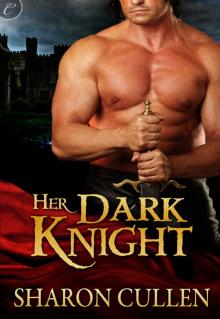 Her Dark Knight
Her Dark Knight Campbell's Redemption
Campbell's Redemption The Reluctant Duchess
The Reluctant Duchess